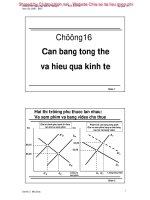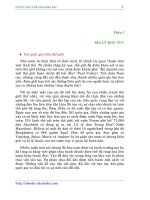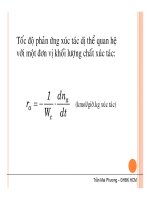The headless horseman
Bạn đang xem bản rút gọn của tài liệu. Xem và tải ngay bản đầy đủ của tài liệu tại đây (2.33 MB, 721 trang )
TheProjectGutenbergEBookofTheHeadlessHorseman,byMayneReid
ThiseBookisfortheuseofanyoneanywhereatnocostandwith
almostnorestrictionswhatsoever.Youmaycopyit,giveitawayor
re-useitunderthetermsoftheProjectGutenbergLicenseincluded
withthiseBookoronlineatwww.gutenberg.org
Title:TheHeadlessHorseman
AStrangeTaleofTexas
Author:MayneReid
ReleaseDate:March16,2011[EBook#35587]
Language:English
***STARTOFTHISPROJECTGUTENBERGEBOOKTHEHEADLESSHORSEMAN***
ProducedbyNickHodsonofLondon,England
CaptainMayneReid
"TheHeadlessHorseman"
"AStrangeTaleofTexas"
Prologue.
ThestagofTexas,reclininginmidnightlair,isstartledfromhisslumbers
bythehoofstrokeofahorse.
He does not forsake his covert, nor yet rise to his feet. His domain is
shared by the wild steeds of the savannah, given to nocturnal straying.
He only uprears his head; and, with antlers o’ertopping the tall grass,
listensforarepetitionofthesound.
Againisthehoofstrokeheard,butwithalteredintonation.Thereisaring
ofmetal—theclinkingofsteelagainststone.
Thesound,significanttotheearofthestag,causesaquickchangeinhis
air and attitude. Springing clear of his couch, and bounding a score of
yardsacrosstheprairie,hepausestolookbackuponthedisturberofhis
dreams.
Intheclearmoonlightofasouthernsky,herecognisesthemostruthless
ofhisenemies—man.Oneisapproachinguponhorseback.
Yielding to instinctive dread, he is about to resume his flight: when
somethingintheappearanceofthehorseman—someunnaturalseeming
—holdshimtransfixedtothespot.
Withhaunchesinquiveringcontactwiththesward,andfrontletfacedto
therear,hecontinuestogaze—hislargebrowneyesstraininguponthe
intruderinamingledexpressionoffearandbewilderment.
Whathaschallengedthestagtosuchprotractedscrutiny?
The horse is perfect in all its parts—a splendid steed, saddled, bridled,
andotherwisecompletelycaparisoned.Initthereappearsnothingamiss
—nothingtoproduceeitherwonderoralarm.Buttheman—therider?Ah!
About him there is something to cause both—something weird—
somethingwanting!
Byheavens!itisthehead!
Even the unreasoning animal can perceive this; and, after gazing a
moment with wildered eyes—wondering what abnormal monster thus
mocksitscervineintelligence—terror-strickenitcontinuesitsretreat;nor
again pauses, till it has plunged through the waters of the Leona, and
placedthecurrentofthestreambetweenitselfandtheghastlyintruder.
Heedless of the affrighted deer—either of its presence, or precipitate
flight—theHeadlessHorsemanrideson.
He,too,isgoinginthedirectionoftheriver.Unlikethestag,hedoesnot
seempressedfortime;butadvancesinaslow,tranquilpace:sosilentas
toseemceremonious.
Apparently absorbed in solemn thought, he gives free rein to his steed:
permitting the animal, at intervals, to snatch a mouthful of the herbage
growingbytheway.Nordoeshe,byvoiceorgesture,urgeitimpatiently
onward,whenthehowl-barkoftheprairie-wolfcausesittoflingitshead
onhigh,andstandsnortinginitstracks.
He appears to be under the influence of some all-absorbing emotion,
fromwhichnocommonincidentcanawakehim.Thereisnospeech—not
a whisper—to betray its nature. The startled stag, his own horse, the
wolf, and the midnight moon, are the sole witnesses of his silent
abstraction.
Hisshouldersshroudedunderaserapé,oneedgeofwhich,flirtedupby
the wind, displays a portion of his figure: his limbs encased in “waterguards”ofjaguar-skin:thussufficientlyshelteredagainstthedewsofthe
night, or the showers of a tropical sky, he rides on—silent as the stars
shining above, unconcerned as the cicada that chirrups in the grass
beneath,ortheprairiebreezeplayingwiththedraperyofhisdress.
Somethingatlengthappearstorousefromhisreverie,andstimulatehim
togreaterspeed—hissteed,atthesametime.Thelatter,tossingupits
head,givesutterancetoajoyousneigh;and,withoutstretchedneck,and
spreadnostrils,advancesinagaitgraduallyincreasingtoacanter.The
proximityoftheriverexplainsthealteredpace.
The horse halts not again, till the crystal current is surging against his
flanks, and the legs of his rider are submerged knee-deep under the
surface.
Theanimaleagerlyassuagesitsthirst;crossestotheoppositeside;and,
withvigorousstride,ascendstheslopingbank.
Uponthecrestoccursapause:asiftheridertarriedtillhissteedshould
shake the water from its flanks. There is a rattling of saddle-flaps, and
stirrup-leathers, resembling thunder, amidst a cloud of vapour, white as
thesprayofacataract.
Out of this self-constituted nimbus, the Headless Horseman emerges;
andmovesonward,asbefore.
Apparently pricked by the spur, and guided by the rein, of his rider, the
horsenolongerstraysfromthetrack;butstepsbrisklyforward,asifupon
apathalreadytrodden.
A treeless savannah stretches before—selvedged by the sky. Outlined
against the azure is seen the imperfect centaurean shape gradually
dissolving in the distance, till it becomes lost to view, under the mystic
gloamingofthemoonlight!
ChapterOne.
TheBurntPrairie.
On the great plain of Texas, about a hundred miles southward from the
oldSpanishtownofSanAntoniodeBejar,thenoondaysunisshedding
his beams from a sky of cerulean brightness. Under the golden light
appearsagroupofobjects,butlittleinunisonwiththelandscapearound
them:sincetheybetokenthepresenceofhumanbeings,inaspotwhere
thereisnosignofhumanhabitation.
The objects in question are easily identified—even at a great distance.
Theyarewaggons;eachcoveredwithitsribbedandroundedtiltofsnowwhite“Osnaburgh.”
There are ten of them—scarce enough to constitute a “caravan” of
traders,noryeta“governmenttrain.”Theyaremorelikelytheindividual
propertyofanemigrant;whohaslandeduponthecoast,andiswending
hiswaytooneofthelate-formedsettlementsontheLeona.
Slowlycrawlingacrossthesavannah,itcouldscarcebetoldthattheyare
inmotion;butfortheirrelative-position,inlongserriedline,indicatingthe
orderofmarch.
Thedarkbodiesbetweeneachtwodeclarethattheteamsareattached;
andthattheyaremakingprogressisproved,bytheretreatingantelope,
scaredfromitsnoondaysiesta,andthelong-shankedcurlew,risingwith
ascreechfromthesward—bothbirdandbeastwonderingatthestringof
strangebehemoths,thusinvadingtheirwildernessdomain.
Elsewhere upon the prairie, no movement may be detected—either of
bird or quadruped. It is the time of day when all tropical life becomes
torpid,orseeksreposeintheshade;manalone,stimulatedbytheloveof
gain,orthepromptingsofambition,disregardingthelawsofnature,and
defyingthefervourofthesun.
So seems it with the owner of the tilted train; who, despite the relaxing
influenceofthefiercemid-dayheat,keepsmovingon.
Thatheisanemigrant—andnotoneoftheordinaryclass—isevidenced
in a variety of ways. The ten large waggons of Pittsburgh build, each
hauled by eight able-bodied mules; their miscellaneous contents:
plenteousprovisions,articlesofcostlyfurniture,evenofluxe,livestockin
the shape of coloured women and children; the groups of black and
yellow bondsmen, walking alongside, or straggling foot-sore in the rear;
thelighttravellingcarriageinthelead,drawnbyaspanofsleek-coated
Kentuckymules,anddrivenbyablackJehu,swelteringinasuitoflivery;
allbespeak,notapoorNorthern-Statessettlerinsearchofanewhome,
butarichSouthernerwhohasalreadypurchasedone,andisonhisway
totakepossessionofit.
Andthisistheexactstoryofthetrain.Itisthepropertyofaplanterwho
haslandedatIndianola,ontheGulfofMatagorda;andisnowtravelling
overland—enrouteforhisdestination.
In the cortège that accompanies it, riding habitually at its head, is the
planter himself—Woodley Poindexter—a tall thin man of fifty, with a
slightly sallowish complexion, and aspect proudly severe. He is simply
thoughnotinexpensivelyclad:inalooselyfittingfrockofalpacacloth,a
waistcoat of black satin, and trousers of nankin. A shirt of finest linen
showsitsplaitsthroughtheopeningofhisvest—itscollarembracedbya
piece of black ribbon; while the shoe, resting in his stirrup, is of finest
tanned leather. His features are shaded by a broad-brimmed Leghorn
hat.
Two horsemen are riding alongside—one on his right, the other on the
left—astriplingscarcetwenty,andayoungmansixorsevenyearsolder.
The former is his son—a youth, whose open cheerful countenance
contrasts, not only with the severe aspect of his father, but with the
somewhat sinister features on the other side, and which belong to his
cousin.
TheyouthisdressedinaFrenchblouseofsky-coloured“cottonade,”with
trousersofthesamematerial;amostappropriatecostumeforasouthern
climate, and which, with the Panama hat upon his head, is equally
becoming.
Thecousin,anex-officerofvolunteers,affectsamilitaryundressofdark
bluecloth,withaforagecaptocorrespond.
Thereisanotherhorsemanridingnear,who,onlyonaccountofhavinga
white skin—not white for all that—is entitled to description. His coarser
features,andcheaperhabiliments;thekeel-coloured“cowhide”clutched
in his right hand, and flirted with such evident skill, proclaim him the
overseer—and whipper up—of the swarthy pedestrians composing the
entourageofthetrain.
The travelling carriage, which is a “carriole”—a sort of cross between a
Jersey waggon and a barouche—has two occupants. One is a young
ladyofthewhitestskin;theotheragirloftheblackest.Theformeristhe
daughter of Woodley Poindexter—his only daughter. She of the sable
complexionistheyounglady’shandmaid.
The emigrating party is from the “coast” of the Mississippi—from
Louisiana. The planter is not himself a native of this State—in other
wordsaCreole;butthetypeisexhibitedinthecountenanceofhisson—
still more in that fair face, seen occasionally through the curtains of the
carriole,andwhosedelicatefeaturesdeclaredescentfromoneofthose
endorseddamsels—fillesàlacasette—who,morethanahundredyears
ago,cameacrosstheAtlanticprovidedwithproofsoftheirvirtue—inthe
casket!
A grand sugar planter of the South is Woodley Poindexter; one of the
highestandhaughtiestofhisclass;oneofthemostprofuseinaristocratic
hospitalities: hence the necessity of forsaking his Mississippian home,
and transferring himself and his “penates,”—with only a remnant of his
“niggers,”—tothewildsofsouth-westernTexas.
Thesunisuponthemeridianline,andalmostinthezenith.Thetravellers
tread upon their own shadows. Enervated by the excessive heat, the
whitehorsemensitsilentlyintheirsaddles.Eventheduskypedestrians,
lesssensibletoitsinfluence,haveceasedtheirgarrulous“gumbo;”and,
instragglinggroups,shamblelistlesslyalongintherearofthewaggons.
Thesilence—solemnasthatofafunerealprocession—isinterruptedonly
at intervals by the pistol-like crack of a whip, or the loud “wo-ha,”
deliveredindeepbaritonefromthethicklipsofsomesableteamster.
Slowlythetrainmoveson,asifgropingitsway.Thereisnoregularroad.
The route is indicated by the wheel-marks of some vehicles that have
passedbefore—barelyconspicuous,byhavingcrushedtheculmsofthe
shotgrass.
Notwithstanding the slow progress, the teams are doing their best. The
planter believes himself within less than twenty miles of the end of his
journey. He hopes to reach it before night: hence the march continued
throughthemid-dayheat.
Unexpectedly the drivers are directed to pull up, by a sign from the
overseer;whohasbeenridingahundredyardsintheadvance,andwho
is seen to make a sudden stop—as if some obstruction had presented
itself.
Hecomestrottingbacktowardsthetrain.Hisgesturestellofsomething
amiss.Whatisit?
TherehasbeenmuchtalkaboutIndians—ofaprobabilityoftheirbeing
encounteredinthisquarter.
Can it be the red-skinned marauders? Scarcely: the gestures of the
overseerdonotbetrayactualalarm.
“Whatisit,MrSansom?”askedtheplanter,asthemanrodeup.
“Thegrassairburnt.Theprairy’sbeenafire.”
“Been on fire! Is it on fire now?” hurriedly inquired the owner of the
waggons, with an apprehensive glance towards the travelling carriage.
“Where?Iseenosmoke!”
“No,sir—no,”stammeredtheoverseer,becomingconsciousthathehad
caused unnecessary alarm; “I didn’t say it air afire now: only thet it hez
been,anthehulgroundairasblackastheteno’spades.”
“Ta—tat! what of that? I suppose we can travel over a black prairie, as
safelyasagreenone?
“Whatnonsenseofyou,JoshSansom,toraisesucharowaboutnothing
—frighteningpeopleoutoftheirsenses!Ho!there,youniggers!Laythe
leathertoyourteams,andletthetrainproceed.Whipup!—whipup!”
“But, Captain Calhoun,” protested the overseer, in response to the
gentlemanwhohadreproachedhiminsuchchasteterms;“howairweto
findtheway?”
“Findtheway!Whatareyouravingabout?Wehaven’tlostit—havewe?”
“I’mafeerdwehev,though.Thewheel-tracksain’tnolongertobeseen.
They’reburntout,alongwi’thegrass.”
“What matters that? I reckon we can cross a piece of scorched prairie,
without wheel-marks to guide us? We’ll find them again on the other
side.”
“Ye-es,”naïvelyrespondedtheoverseer,who,althougha“down-easter,”
had been far enough west to have learnt something of frontier life; “if
theerairanyotherside.Ikedn’tseeitouto’theseddle—ne’erasigno’
it.”
“Whip up, niggers! whip up!” shouted Calhoun, without heeding the
remark;andspurringonwards,asasignthattheorderwastobeobeyed.
The teams are again set in motion; and, after advancing to the edge of
theburnttract,withoutinstructionsfromanyone,areoncemorebrought
toastand.
The white men on horseback draw together for a consultation. There is
need:asallaresatisfiedbyasingleglancedirectedtothegroundbefore
them.
Farastheeyecanreachthecountryisofoneuniformcolour—blackas
Erebus. There is nothing green—not a blade of grass—not a reed nor
weed!
Itisafterthesummersolstice.Theripenedculmsofthegramineae,and
thestalksoftheprairieflowers,havealikecrumbledintodustunderthe
devastatingbreathoffire.
Infront—ontherightandleft—totheutmostvergeofvisionextendsthe
sceneofdesolation.Overittheceruleanskyischangedtoadarkerblue;
thesun,thoughclearofclouds,seemstoscowlratherthanshine—asif
reciprocatingthefrownoftheearth.
The overseer has made a correct report—there is no trail visible. The
action of the fire, as it raged among the ripe grass, has eliminated the
impression of the wheels hitherto indicating the route. “What are we to
do?”
The planter himself put this inquiry, in a tone that told of a vacillating
spirit.
“Do,uncleWoodley!Whatelsebutkeepstraighton?Therivermustbe
ontheotherside?Ifwedon’thitthecrossing,toahalfmileorso,wecan
goup,ordownthebank—asthecasemayrequire.”
“But,Cassius:ifweshouldloseourway?”
“We can’t. There’s but a patch of this, I suppose? If we do go a little
astray,wemustcomeoutsomewhere—ononeside,ortheother.”
“Well,nephew,youknowbest:Ishallbeguidedbyyou.”
“Nofear,uncle.I’vemademywayoutofaworsefixthanthis.Driveon,
niggers!Keepstraightafterme.”
The ex-officer of volunteers, casting a conceited glance towards the
travelling carriage—through the curtains of which appears a fair face,
slightly shadowed with anxiety—gives the spur to his horse; and with
confidentairtrotsonward.
Achorusofwhipcracksissucceededbythetramplingoffourscoremules,
mingledwiththeclankingofwheelsagainsttheirhubs.Thewaggon-train
isoncemoreinmotion.
The mules step out with greater rapidity. The sable surface, strange to
theireyes,excitesthemtobriskeraction—causingthemtoraisethehoof,
assoonasittouchestheturf.Theyoungeranimalsshowfear—snorting,
astheyadvance.
In time their apprehensions become allayed; and, taking the cue from
theirolderassociates,theymoveonsteadilyasbefore.
A mile or more is made, apparently in a direct line from the point of
starting.Thenthereisahalt.Theself-appointedguidehasorderedit.He
has reined up his horse; and is sitting in the saddle with less show of
confidence.Heappearstobepuzzledaboutthedirection.
The landscape—if such it may be called—has assumed a change;
though not for the better. It is still sable as ever, to the verge of the
horizon.Butthesurfaceisnolongeraplain:itrolls.Thereareridges—
gentleundulations—withvalleysbetween.Theyarenotentirelytreeless
—thoughnothingthatmaybetermedatreeisinsight.Therehavebeen
such, before the fire—algarobias, mezquites, and others of the acacia
family—standing solitary, or in copses. Their light pinnate foliage has
disappearedlikeflaxbeforetheflame.Theirexistenceisonlyevidenced
bycharredtrunks,andblackenedboughs.
“You’velosttheway,nephew?”saidtheplanter,ridingrapidlyup.
“No uncle—not yet. I’ve only stopped to have a look. It must lie in this
direction—down that valley. Let them drive on. We’re going all right—I’ll
answerforit.”
Oncemoreinmotion—adowntheslope—thenalongthevalley—thenup
theacclivityofanotherridge—andthenthereisasecondstoppageupon
itscrest.
“You’ve lost the way, Cash?” said the planter, coming up and repeating
hisformerobservation.
“Damned if I don’t believe I have, uncle!” responded the nephew, in a
toneofnotveryrespectfulmistrust.“Anyhow;whothedevilcouldfindhis
wayoutofanashpitlikethis?No,no!”hecontinued,reluctanttobetray
his embarrassment as the carriole came up. “I see now. We’re all right
yet.Therivermustbeinthisdirection.Comeon!”
On goes the guide, evidently irresolute. On follow the sable teamsters,
who, despite their stolidity, do not fail to note some signs of vacillation.
They can tell that they are no longer advancing in a direct line; but
circuitously among the copses, and across the glades that stretch
between.
All are gratified by a shout from the conductor, announcing recovered
confidence.Inresponsethereisauniversalexplosionofwhipcord,with
joyousexclamations.
Oncemoretheyarestretchingtheirteamsalongatravelledroad—where
ahalf-scoreofwheeledvehiclesmusthavepassedbeforethem.Andnot
long before: the wheel-tracks are of recent impress—the hoof-prints of
the animals fresh as if made within the hour. A train of waggons, not
unliketheirown,musthavepassedovertheburntprairie!
Likethemselves,itcouldonlybegoingtowardstheLeona:perhapssome
governmentconvoyonitswaytoFortInge?Inthatcasetheyhaveonly
tokeepinthesametrack.TheFortisonthelineoftheirmarch—buta
shortdistancebeyondthepointwheretheirjourneyistoterminate.
Nothingcouldbemoreopportune.Theguide,hithertoperplexed—though
without acknowledging it—is at once relieved of all anxiety; and with a
freshexhibitionofconceit,orderstheroutetoberesumed.
Foramileormorethewaggon-tracksarefollowed—notinadirectline,
but bending about among the skeleton copses. The countenance of
Cassius Calhoun, for a while wearing a confident look, gradually
becomes clouded. It assumes the profoundest expression of
despondency, on discovering that the four-and-forty wheel-tracks he is
following,havebeenmadebytenPittsburghwaggons,andacarriole—
thesamethatarenowfollowinghim,andinwhosecompanyhehasbeen
travellingallthewayfromtheGulfofMatagorda!
ChapterTwo.
TheTrailoftheLazo.
Beyond doubt, the waggons of Woodley Poindexter were going over
groundalreadytracedbythetiringoftheirwheels.
“Our own tracks!” muttered Calhoun on making the discovery, adding a
fierceoathashereinedup.
“Our own tracks! What mean you, Cassius? You don’t say we’ve been
travelling—”
“On our own tracks. I do, uncle; that very thing. We must have made a
complete circumbendibus of it. See! here’s the hind hoof of my own
horse,withhalfashoeoff;andthere’sthefootoftheniggers.Besides,I
cantelltheground.That’stheveryhillwewentdownasweleftourlast
stoppingplace.Hangthecrookedluck!We’vemadeacoupleofmilesfor
nothing.”
Embarrassment is no longer the only expression upon the face of the
speaker. It has deepened to chagrin, with an admixture of shame. It is
through him that the train is without a regular guide. One, engaged at
Indianola, had piloted them to their last camping place. There, in
consequenceofsomedispute,duetothesurlytemperoftheex-captain
ofvolunteers,themanhaddemandedhisdismissal,andgoneback.
For this—as also for an ill-timed display of confidence in his power to
conductthemarch—istheplanter’snephewnowsufferingunderasense
of shame. He feels it keenly as the carriole comes up, and bright eyes
becomewitnessesofhisdiscomfiture.
Poindexter does not repeat his inquiry. That the road is lost is a fact
evident to all. Even the barefooted or “broganned” pedestrians have
recognisedtheirlong-heeledfootprints,andbecomeawarethattheyare
forthesecondtimetreadinguponthesameground.
Thereisageneralhalt,succeededbyananimatedconversationamong
thewhitemen.Thesituationisserious:theplanterhimselfbelievesitto
be so. He cannot that day reach the end of his journey—a thing upon
whichhehadsethismind.
That is the very least misfortune that can befall them. There are others
possible,andprobable.Thereareperilsupontheburntplain.Theymay
becompelledtospendthenightuponit,withnowaterfortheiranimals.
Perhapsaseconddayandnight—orlonger—whocantellhowlong?
Howaretheytofindtheirway?Thesunisbeginningtodescend;though
still too high in heaven to indicate his line of declination. By waiting a
whiletheymaydiscoverthequartersofthecompass.
Buttowhatpurpose?Theknowledgeofeast,west,north,andsouthcan
availnothingnow:theyhavelosttheirlineofmarch.
Calhounhasbecomecautious.Henolongervolunteerstopointoutthe
path. He hesitates to repeat his pioneering experiments—after such
manifestandshamefulfailure.
A ten minutes’ discussion terminates in nothing. No one can suggest a
feasible plan of proceeding. No one knows how to escape from the
embraceofthatdarkdesert,whichappearstocloudnotonlythesunand
sky,butthecountenancesofallwhoenterwithinitslimits.
A flock of black vultures is seen flying afar off. They come nearer, and
nearer.Somealightupontheground—othershoverabovetheheadsof
thestrayedtravellers.Isthereabodinginthebehaviourofthebirds?
Another ten minutes is spent in the midst of moral and physical gloom.
Then,asifbyabenignantmandatefromheaven,doescheerfulnessreassume its sway. The cause? A horseman riding in the direction of the
train!
Anunexpectedsight:whocouldhavelookedforhumanbeinginsucha
place?Alleyessimultaneouslysparklewithjoy;asif,intheapproachof
thehorseman,theybeheldtheadventofasaviour!
“He’scomingthisway,ishenot?”inquiredtheplanter,scarceconfident
inhisfailingsight.
“Yes,father;straightashecanride,”repliedHenry,liftingthehatfromhis
head,andwavingitonhigh:theactionaccompaniedbyashoutintended
toattractthehorseman.
Thesignalwassuperfluous.Thestrangerhadalreadysightedthehalted
waggons;and,ridingtowardsthematagallop,wassoonwithinspeaking
distance.
He did not draw bridle, until he had passed the train; and arrived upon
thespotoccupiedbytheplanterandhisparty.
“A Mexican!” whispered Henry, drawing his deduction from the
habilimentsofthehorseman.
“Somuchthebetter,”repliedPoindexter,inthesametoneofvoice;“he’ll
beallthemorelikelytoknowtheroad.”
“NotabitofMexicanabouthim,”mutteredCalhoun,“exceptingtherig.I’ll
soonsee.Buenosdias,cavallero!EstaV.Mexicano?”(Goodday,sir!are
youaMexican?)
“No,indeed,”repliedthestranger,withaprotestingsmile.“Anythingbut
that.IcanspeaktoyouinSpanish,ifyoupreferit;butIdaresayyouwill
understand me better in English: which, I presume, is your native
tongue?”
Calhoun, suspecting that he had spoken indifferent Spanish, or
indifferentlypronouncedit,refrainsfrommakingrejoinder.
“American, sir,” replied Poindexter, his national pride feeling slightly
piqued. Then, as if fearing to offend the man from whom he intended
asking a favour, he added: “Yes, sir; we are all Americans—from the
SouthernStates.”
“That I can perceive by your following.” An expression of contempt—
scarceperceptible—showeditselfuponthecountenanceofthespeaker,
as his eye rested upon the groups of black bondsmen. “I can perceive,
too,”headded,“thatyouarestrangerstoprairietravelling.Youhavelost
yourway?”
“We have, sir; and have very little prospect of recovering it, unless we
maycountuponyourkindnesstodirectus.”
“Notmuchkindnessinthat.BythemerestchanceIcameuponyourtrail,
as I was crossing the prairie. I saw you were going astray; and have
riddenthiswaytosetyouright.”
“It is very good of you. We shall be most thankful, sir. My name is
Poindexter—Woodley Poindexter, of Louisiana. I have purchased a
property on the Leona river, near Fort Inge. We were in hopes of
reachingitbeforenightfall.Canwedoso?”
“Thereisnothingtohinderyou:ifyoufollowtheinstructionsIshallgive.”
On saying this, the stranger rode a few paces apart; and appeared to
scrutinise the country—as if to determine the direction which the
travellersshouldtake.
Poised conspicuously upon the crest of the ridge, horse and man
presentedapictureworthyofskilfuldelineation.
Asteed,suchasmighthavebeenriddenbyanArabsheik—blood-bayin
colour—broadincounter—withlimbscleanasculmsofcane,andhipsof
ellipticaloutline,continuedintoamagnificenttailsweepingrearwardlike
arainbow:onhisbackarider—ayoungmanofnotmorethanfive-andtwenty—ofnobleformandfeatures;habitedinthepicturesquecostume
of a Mexican ranchero—spencer jacket of velveteen—calzoneros laced
alongtheseams—calzoncillosofsnow-whitelawn—botasofbuffleather,
heavily spurred at the heels—around the waist a scarf of scarlet crape;
andonhisheadahatofblackglaze,bandedwithgoldbullion.Pictureto
yourself a horseman thus habited; seated in a deep tree-saddle, of
Moorish shape and Mexican manufacture, with housings of leather
stamped in antique patterns, such as were worn by the caparisoned
steeds of the Conquistadores; picture to yourself such a cavallero,and
you will have before your mind’s eye a counterpart of him, upon whom
theplanterandhispeopleweregazing.
Through the curtains of the travelling carriage he was regarded with
glances that spoke of a singular sentiment. For the first time in her life,
Louise Poindexter looked upon that—hitherto known only to her
imagination—a man of heroic mould. Proud might he have been, could
he have guessed the interest which his presence was exciting in the
breastoftheyoungCreole.
Hecouldnot,anddidnot.Hewasnotevenawareofherexistence.He
hadonlyglancedatthedust-bedaubedvehicleinpassing—asonemight
look upon the rude incrustation of an oyster, without suspecting that a
preciouspearlmayliegleaminginside.
“Bymyfaith!”hedeclared,facingroundtotheownerofthewaggons,“I
candiscovernolandmarksforyoutosteerby.Forallthat,Icanfindthe
way myself. You will have to cross the Leona five miles below the Fort;
and,asIhavetogobythecrossingmyself,youcanfollowthetracksof
myhorse.Goodday,gentlemen!”
Thusabruptlybiddingadieu,hepressedthespuragainstthesideofhis
steed;andstartedoffatagallop.
An unexpected—almost uncourteous departure! So thought the planter
andhispeople.
Theyhadnotimetomakeobservationsuponit,beforethestrangerwas
seenreturningtowardsthem!
Intensecondshewasagainintheirpresence—alllisteningtolearnwhat
hadbroughthimback.
“I fear the tracks of my horse may prove of little service to you. The
mustangs have been this way, since the fire. They have made hoofmarksbythethousand.Mineareshod;but,asyouarenotaccustomed
totrailing,youmaynotbeabletodistinguishthem—themoreso,thatin
thesedryashesallhorse-tracksaresonearlyalike.”
“Whatarewetodo?”despairinglyaskedtheplanter.
“I am sorry, Mr Poindexter, I cannot stay to conduct you, I am riding
express,withadespatchfortheFort.Ifyoushouldlosemytrail,keepthe
sunonyourrightshoulders:sothatyourshadowsmayfalltotheleft,at
an angle of about fifteen degrees to your line of march. Go straight
forwardforaboutfivemiles.Youwillthencomeinsightofthetopofatall
tree—a cypress. You will know it by its leaves being in the red. Head
directforthistree.Itstandsonthebankoftheriver;andclosebyisthe
crossing.”
Theyounghorseman,oncemoredrawinguphisreins,wasabouttoride
off; when something caused him to linger. It was a pair of dark lustrous
eyes—observed by him for the first time—glancing through the curtains
ofthetravellingcarriage.
Theirownerwasinshadow;buttherewaslightenoughtoshowthatthey
were set in a countenance of surpassing loveliness. He perceived,
moreover,thattheywereturneduponhimself—fixed,ashefancied,inan
expressionthatbetokenedinterest—almosttenderness!
He returned it with an involuntary glance of admiration, which he made
but an awkward attempt to conceal. Lest it might be mistaken for
rudeness,hesuddenlyfacedround;andoncemoreaddressedhimselfto
theplanter—whohadjustfinishedthankinghimforhiscivility.
“Iambutilldeservingthanks,”washisrejoinder,“thustoleaveyouwitha
chanceoflosingyourway.But,asI’vetoldyou,mytimeismeasured.”
Thedespatch-bearerconsultedhiswatch—asthoughnotalittlereluctant
totravelalone.
“Youareverykind,sir,”saidPoindexter;“butwiththedirectionsyouhave
givenus,Ithinkweshallbeabletomanage.Thesunwillsurelyshowus
—”
“No:nowIlookatthesky,itwillnot.Therearecloudsloominguponthe
north. In an hour, the sun may be obscured—at all events, before you
can get within sight of the cypress. It will not do. Stay!” he continued,
after a reflective pause, “I have a better plan still: follow the trail of my
lazo!”
While speaking, he had lifted the coiled rope from his saddlebow, and
flungthelooseendtotheearth—theotherbeingsecuredtoaringinthe
pommel. Then raising his hat in graceful salutation—more than half
directed towards the travelling carriage—he gave the spur to his steed;
andoncemoreboundedoffovertheprairie.
The lazo, lengthening out, tightened over the hips of his horse; and,
draggingadozenyardsbehind,leftalineuponthecinereoussurface—
as if some slender serpent had been making its passage across the
plain.
“An exceedingly curious fellow!” remarked the planter, as they stood
gazingafterthehorseman,fastbecominghiddenbehindacloudofsable
dust.“Ioughttohaveaskedhimhisname?”
“An exceedingly conceited fellow, I should say,” muttered Calhoun; who
hadnotfailedtonoticetheglancesentbythestrangerinthedirectionof
the carriole, nor that which had challenged it. “As to his name, I don’t
thinkitmattersmuch.Itmightn’tbehisownhewouldgiveyou.Texasis
fullofsuchswells,whotakenewnameswhentheygethere—bywayof
improvement,iffornobetterreason.”
“Come,cousinCash,”protestedyoungPoindexter;“youareunjusttothe
stranger. He appears to be educated—in fact, a gentleman—worthy of
bearingthebestofnames,Ishouldsay.”
“A gentleman! Deuced unlikely: rigged out in that fanfaron fashion. I
neversawamanyet,thattooktoaMexicandress,whowasn’taJack.
He’sone,I’llbebound.”
Duringthisbriefconversation,thefairoccupantofthecarriolewasseen
tobendforward;anddirectalookofevidentinterest,aftertheformofthe
horsemanfastrecedingfromherview.
Tothis,perhaps,mighthavebeentracedtheacrimonyobservableinthe
speechofCalhoun.
“What is it, Loo?” he inquired, riding close up to the carriage, and
speaking in a voice not loud enough to be heard by the others. “You
appearimpatienttogoforward?Perhapsyou’dliketorideoffalongwith
thatswaggeringfellow?Itisn’ttoolate:I’lllendyoumyhorse.”
The young girl threw herself back upon the seat—evidently displeased,
both by the speech and the tone in which it was delivered. But her
displeasure,insteadofexpressingitselfinafrown,orintheshapeofan
indignantrejoinder,wasconcealedunderaguisefarmoregallingtohim
whohadcausedit.Aclearringinglaughwastheonlyreplyvouchsafedto
him.
“So, so! I thought there must be something—by the way you behaved
yourselfinhispresence.Youlookedasifyouwouldhaverelishedatêteà-tête with this showy despatch-bearer. Taken with his stylish dress, I
suppose? Fine feathers make fine birds. His are borrowed. I may strip
themoffsomeday,alongwithalittleoftheskinthat’sunderthem.”
“Forshame,Cassius!yourwordsareascandal!”
“’Tis you should think of scandal, Loo! To let your thoughts turn on a
common scamp—a masquerading fellow like that! No doubt the letter
carrier,employedbytheofficersattheFort!”
“A letter carrier, you think? Oh, how I should like to get love letters by
suchapostman!”
“Youhadbetterhastenon,andtellhimso.Myhorseisatyourservice.”
“Ha!ha!ha!Whatasimpletonyoushowyourself!Suppose,forjesting’s
sake,Idid have a fancy to overtake this prairie postman! It couldn’t be
doneuponthatdullsteedofyours:notabitofit!Attherateheisgoing,
heandhisblood-baywillbeoutofsightbeforeyoucouldchangesaddles
for me. Oh, no! he’s not to be overtaken by me, however much I might
likeit;andperhapsImightlikeit!”
“Don’tletyourfatherhearyoutalkinthatway.”
“Don’tlethimhearyoutalkinthatway,”retortedtheyounglady,forthe
first time speaking in a serious strain. “Though you are my cousin, and
papamaythinkyouthepinkofperfection,Idon’t—notI!InevertoldyouI
did—did I?” A frown, evidently called forth by some unsatisfactory
reflection,wastheonlyreplytothistantalisinginterrogative.
“Youare my cousin,” she continued, in a tone that contrasted strangely
with the levity she had already exhibited, “but you are nothing more—
nothing more—Captain Cassius Calhoun! You have no claim to be my
counsellor. There is but one from whom I am in duty bound to take
advice, or bear reproach. I therefore beg of you, Master Cash, that you
will not again presume to repeat such sentiments—as those you have
justfavouredmewith.Ishallremainmistressofmyownthoughts—and
actions, too—till I have found a master who can control them. It is not
you!”
Having delivered this speech, with eyes flashing—half angrily, half
contemptuously—upon her cousin, the young Creole once more threw
herselfbackuponthecushionsofthecarriole.
Theclosingcurtainsadmonishedtheex-officer,thatfurtherconversation
wasnotdesired.
Quailingunderthelashofindignantinnocence,hewasonlytoohappyto
hear the loud “gee-on” of the teamsters, as the waggons commenced
moving over the sombre surface—not more sombre than his own
thoughts.









